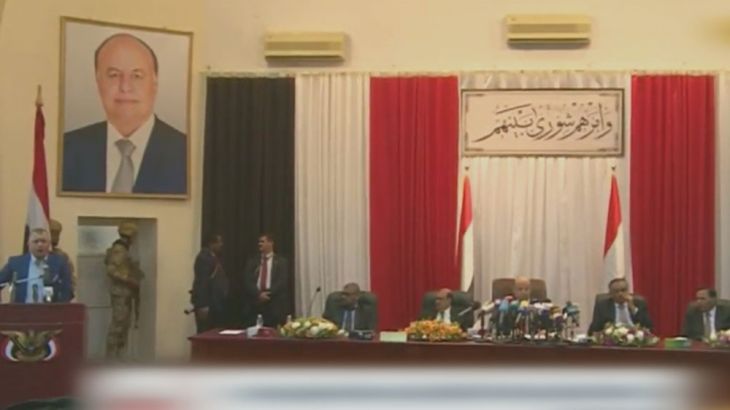Yemen’s Hadi attends rare parliamentary session
President-aligned parliamentarians gather in Sayoun, eastern Yemen, elect GPC’s Sultan al-Burkani as new speaker.

President Abd-Rabbu Mansour Hadi, the head of Yemen’s internationally recognised government, has made a rare visit to the war-torn country for a meeting of its divided parliament.
Hadi, who lives in Saudi Arabia, while rival Houthi rebels control the capital, Sanaa, attended the parliamentary session on Saturday in the government-controlled city of Sayoun, in eastern Yemen.
The government said some 141 members of the 301-strong assembly attended the meeting, seen as aimed at consolidating the Hadi government’s legitimacy disputed by rebels. The assembly was elected in 2003, but its mandate has been extended several times due to election delays over instability in the country.
Yemen’s Saudi-backed government led by Hadi and the Houthi forces have been engaged in a power struggle since late 2014, resulting in the world’s worst humanitarian crisis, according to the United Nations.
The implementation of a UN-brokered peace deal reached in December has since been in limbo.
“This extraordinary session is held in a historic moment as we stand in a crossroad between choices of war and peace,” Hadi said.
“Hasn’t the time come to lay down arms and initiate peace? We stretch out our hands with peace to the Houthis,” he told the parliamentary session.
During the meeting, parliamentarians elected Sultan al-Burkani of the General People’s Congress (GPC) of late former Yemeni President Ali Abdullah Saleh as their new speaker.
‘Political blow’ for Houthis
|
|
Yemeni parliament is split between Houthi supporters, government supporters and independents.
The Yemeni government is currently based in the southern city of Aden.
Local authorities in Aden, who are allied with the United Arab Emirates, refused to allow parliament to convene there.
“This is the first time that the coalition allies have been able to gather so many parliament members in one place to have a session,” said Hakim al-Masmari, the editor-in-chief and publisher of the Yemen Post, from Sanaa.
According to al-Masmari’s sources, 134 MPs attended the meeting, while “138 are required to legalise the session”, he said.
“The coalition is claiming that 141 were there and if this number was completed, this is a major blow politically for the Houthis and they lose a lot of ground when it comes to negotiations because, right now, the parliament has a lot of authority and can move on resolutions that are anti-Houthi,” he added.
![A woman casts her vote during a complementary parliamentary election in Sanaa on Saturday [Khaled Abdullah/Reuters]](/wp-content/uploads/2019/04/b35157e549eb4613b50428514f7af611_18.jpeg?quality=80)
Meanwhile, in Sanaa, the Houthis have started to organise elections to fill 24 vacant seats in the same parliament, Saba news agency said.
“Voters will elect who will represent them constitutionally and legally,” Houthi Prime Minister Abdelaziz Bin Habtour was quoted as saying by Saba.
Yemen has been wracked by violence since 2014 when Houthi rebels overran much of the country, including Sanaa.
The crisis escalated in 2015 when a Saudi-UAE-led military coalition launched a devastating air campaign in Yemen in hopes of rolling back Houthi gains.
The violence has destroyed much of Yemen’s basic infrastructure, including water and sanitation systems.
Tens of thousands of people, mostly civilians, have been killed and economic collapse has left millions facing severe hunger.